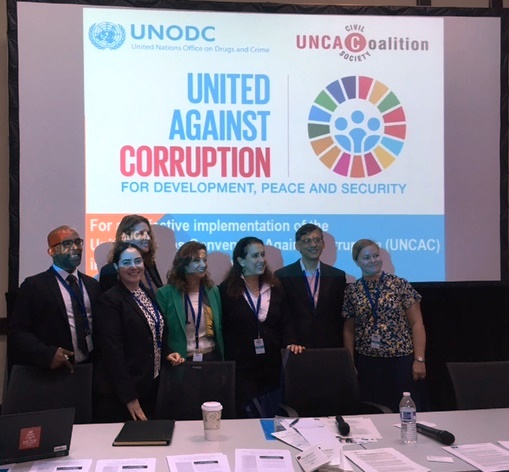5 December 2016, UNODC.
This post was originally published on the United Nations Office on Drugs and Crime website.
UN Convention against Corruption (UNCAC) Coalition and UNODC’s specialists encourage participants of Anti-Corruption Conference to work jointly for an effective implementation of UNCAC in support of SDG Goal 16

On the occasion of the 17th International Anti-Corruption Conference (IACC) in Panama, UNODC and the UNCAC Coalition organized a workshop during the global forum on 4 December to raise awareness, share experiences and stimulate debate around two major and complementary instruments which address corruption and advance equality globally: the United Nations Convention against Corruption and the Sustainable Development Goals (SDGs), in particular Goal 16, which promotes peaceful and inclusive societies, strong institutions and access to justice for all.
UNODC, as the guardian of the Convention and Secretariat to its Implementation Review Mechanism, is partnering with civil society, in particular the UNCAC Coalition, to effectively promote the implementation of the Convention and its Review Mechanism, and to provide civil society a constructive role in this effort.
The UNCAC is the only universal, legally binding anti-corruption instrument with 180 States parties. “The Convention addresses corruption from a comprehensive and holistic perspective, reflecting a deeper and more nuanced understanding of the causes and effects of corruption”, emphasized Candice Welsch, Chief of UNODC’s Implementation Support Section of the Corruption and Economic Crime Branch. Ms. Welsch also highlighted that the UNCAC review mechanism is a strong catalyst for reforms and that, so far, about 85% of the States have involved non-governmental stakeholders in the review.
In this regard, Gillian Dell, Head of the Transparency International’s Conventions Unit and secretariat to the UNCAC Coalition, highlighted the central role of an inclusive review mechanism in strengthening the implementation of UNCAC and thereby making the SDGs meaningful. Ms. Dell also took the opportunity to present the initiative of the UNCAC Review Transparency Pledge which is calling for inclusiveness at all levels and asking governments to ensure transparency and engage civil society throughout the UNCAC review process in their countries.
For her part, Shaazka Beyerle, Author of Curtailing Corruption: People Power for Accountability and Justice, also recalled Article 13 of the UNCAC and further emphasized that citizens and civil society organizations, through peaceful non-violent actions, could indeed contribute considerably towards curbing corruption, building accountability and countering marginalization.
In relation to economic crime, Christine Clough, Programme Manager at Global Financial Integrity, discussed the illicit financial flows as a major challenge for development, which is recognized in SDG target 16.4. She also introduced the audience to the GFTrade system, a tool developed by Global Financial Integrity allowing tracking trade misinvoicing and assessing the risk of trade based money laundering.
Manzoor Hasan, Chair of the UNCAC Coalition and Executive director of the South Asian Institute of Advanced Legal and Human Rights Studies, presented a case study of Bangladesh and highlighted the key lessons learned to address the link between organized crime, corruption and development. Mr. Hasan emphasized the need to frame future programmes which brought together anti-corruption efforts, access to justice, rule of law, non-violence, inclusiveness and institutional integrity to sustain the current economic development. He also explained that there was no “silver bullet”: long-term efforts were required to change the strong, firmly embedded interests of those who take advantage of the existing situation. Furthermore, he added that there are no “one size fits all” solutions: empowerment of local actors and sustained social movement were essential to establish justice at the local level; creative ways were sought to restore the rule of law; and proper analysis, indicators and a monitoring and evaluation framework are crucial to sustainably address corruption.
Finally, Rukshana Nanayakkara, Advocacy Manager for SDGs, Transparency International, was the last speaker of the Workshop. He recalled the complementary nature of, and inter-linkages between, the UNCAC and the SDG Goal 16: they need to be understood collectively, avoiding separating efforts and silos, to achieve peace, development, and security. More than that, Mr. Nanayakkara encouraged participants to dig deep into their specific sectors to identify the corruption risks and go beyond Goal 16 as all SDGs and areas are at risk due to corruption.
Time for Action!
- Increase your knowledge on the UNCAC and its Review Mechanism, on how UNODC work with Civil Society and on the SDGs!
- Be #UnitedAgainstCorruption, support the International Anti-Corruption Day Campaign (9 December) and act using the campaign materials;
- Inform yourself on the UNCAC Review Transparency Pledge, the initiative of the UNCAC Coalition calling for inclusiveness;
- Check the GFTrade system to track trade misinvoicing and assess the risk of trade based money laundering.



